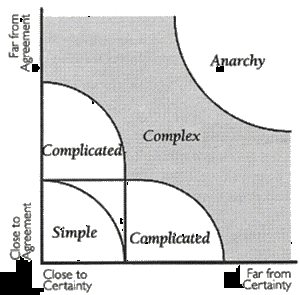
My colleagues at FSG and I have extensively written and spoken about acknowledging the importance of complexity when it comes to social change, whether in collective impact, strategic philanthropy, or evaluation. I have personally used the below graphic, an idea originally developed by Brenda Zimmerman and others, dozens of times in talks, presentations, and meetings to help folks wrap their minds around the idea of complexity. I would often see the notion of complexity “clicking” for audiences, especially when I used the example of “raising a child.”
Then something happened. I had a child.
My wife and I had our lovely daughter in August. As the first few weeks unfolded, I started to gain an entirely new appreciation of complexity. The graphic that stuck in my head wasn’t so much the one above, but another one developed by complexity scientist Ralph Stacey (shown below).

Stacey talked about being “close to” or “far from” on two critical dimensions that help locate the domain in which a problem or issue lies:
- Agreement: How much agreement exists about what the right strategies are to get to a result?
- Certainty: How certain is it that the applying the strategies will lead to the desired result?
When it comes to simple problems, they are considered to be “close to” on both dimensions. Complicated ones may be “close to” on one dimension, while being “far from” on the other. Complex problems are “far from” on both dimensions, and beyond the zone of complexity lies anarchy.
Babying and Complexity
As my wife and I negotiated the early weeks as new parents, it became eminently clear to us which zone we were operating in. Consider how dealing with a baby fits along the two dimensions:
Agreement: There seemed to be little agreement on what the right strategies are to soothe, nurture, and comfort a baby. Below are just a few of the examples of contradictory advice we read in the most popular baby books, and/or heard from our health practitioners:
| Never wake a sleeping baby | Wake a sleeping baby every three hours |
| The baby should sleep in his/her own room | The baby should sleep in the parents’ room |
| The baby should be encouraged to self-soothe as soon as possible | Newborns are incapable of self-soothing |
| Bad habits develop early | You can never spoil a newborn |
Certainty: As the baby grew and changed almost every single day, what worked yesterday did not work today. There was no surefire way to calm the baby when she was agitated, nor a tried and tested method of putting her to sleep. As we tried a rotating menu of tips and tricks, my new favorite phrase became “everything works for five minutes.” And just when we thought we had something figured out, the baby would go through a growth spurt and/or some sort of cognitive leap, and everything was up in the air again. There would also be some “regressing” from time to time, proving that it wasn’t anywhere near a linear growth path.
Implications for Social Change
So what does this all mean for social change? The trials and tribulations one experiences as a new parent aren’t that different from what most social change practitioners go through. For example, as a social change practitioner:
- You will get conflicting advice on the right thing to do
- You will often need to hold opposite ideas in mind at the same time
- You will notice that things often get worse before they get better
- You will constantly feel like you are taking “three steps forward; two steps back”
- You will realize that there are no “absolutes”
However, with social change, as with a baby, more predictable paths do eventually emerge, in the forms of patterns that tend to get more familiar over time. Just as a parent gets to know the baby’s “cues” and work with them, you will soon know the right levers to push to accelerate change where things have previously been stuck. But even if you play all your cards right, success isn’t guaranteed. The only thing that is guaranteed, however, is a weary smile on your face at the end of the day, and the assurance that whatever troubles you, is only temporary.
